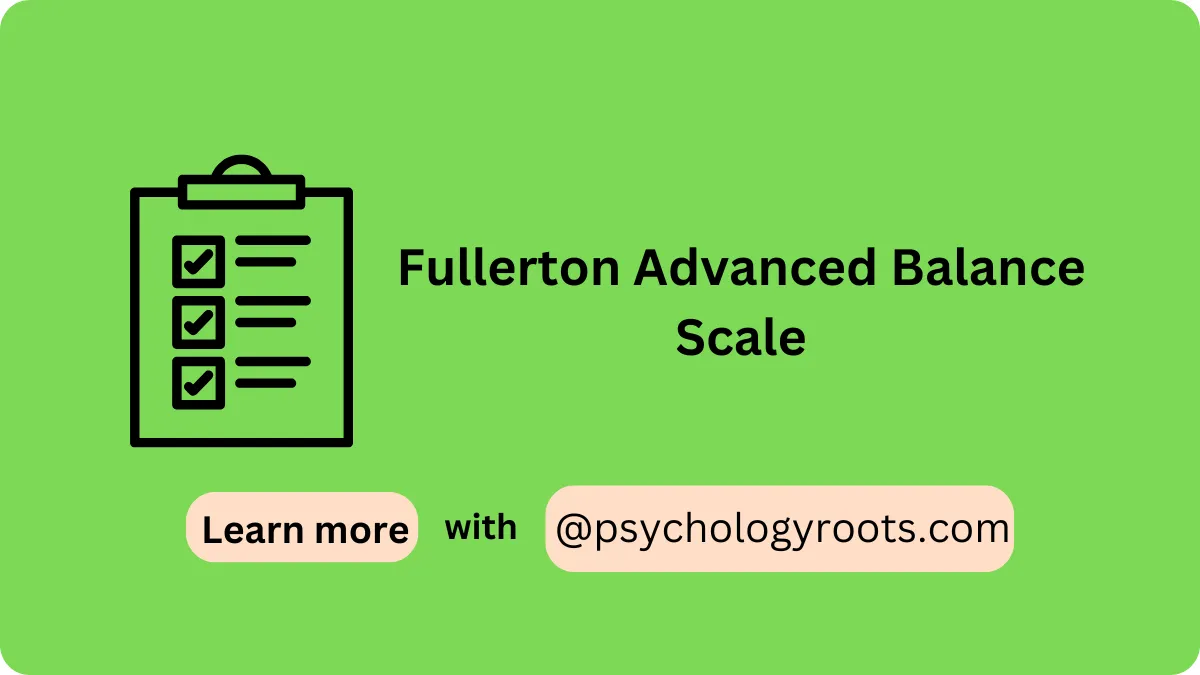Table of Contents
Fullerton Advanced Balance Scale
Here in this post, we are sharing the “Fullerton Advanced Balance Scale”. You can read psychometric and Author information. We have thousands of Scales and questionnaires in our collection (See Scales and Questionnaires). You can demand us any scale and questionnaires related to psychology through our community, and we will provide you with a short time. Keep visiting Psychology Roots.
About Fullerton Advanced Balance Scale
Scale Name
Fullerton Advanced Balance Scale
Author Details
Debra J. Rose
Translation Availability
English

Background/Description
The Fullerton Advanced Balance Scale (FAB), developed by Debra J. Rose in 2006, is a comprehensive assessment tool designed to evaluate balance capabilities in higher-functioning older adults. Unlike traditional balance measures that focus primarily on basic stability, the FAB targets individuals who maintain an active lifestyle yet may still be at risk for falls due to subtle sensory or motor impairments.
Rooted in kinesiology and rehabilitation science, this scale was created to address the limitations of tools like the Berg Balance Scale, which often exhibit ceiling effects in more independent populations. The FAB’s multidimensional approach makes it a standout choice for clinicians and researchers aiming to detect nuanced balance deficits.
The FAB consists of 10 performance-based tasks, scored on a 5-point scale (0 = “unable to perform” to 4 = “performs optimally”), yielding a total score range of 0 to 40. Tasks include standing with feet together and eyes closed, reaching forward, turning 360 degrees, and stepping up onto a platform, assessing static, dynamic, and sensory aspects of balance.
Typically completed in 10-15 minutes, the FAB provides a detailed profile of an individual’s balance strengths and weaknesses, guiding fall prevention strategies. Its adaptability across languages and settings, from community-dwelling older adults to those with neurological conditions like Parkinson’s or stroke, underscores its versatility and global utility in promoting functional independence.
Administration, Scoring and Interpretation
- Obtain the copy: Acquire the FAB protocol from its original publication by Rose et al. (2006) in Archives of Physical Medicine and Rehabilitation or authorized rehabilitation resources, ensuring proper training for administration.
- Explain the purpose: Inform participants that the scale assesses their balance abilities to identify fall risk and support tailored interventions for maintaining independence.
- Provide instructions: Clearly explain and demonstrate each of the 10 tasks, instructing participants to perform them to the best of their ability, with safety precautions in place.
- Approximate time: Allow approximately 10-15 minutes for completion, adjusting for individual pace or need for rest between tasks.
- Administer the scale: Conduct the test in a controlled, safe environment with a flat surface and necessary equipment (e.g., foam pad, step), scoring performance in real-time.
Reliability and Validity
The Fullerton Advanced Balance Scale exhibits strong psychometric properties, making it a reliable and valid measure for balance assessment. Internal consistency is high, with Cronbach’s alpha coefficients ranging from 0.80 to 0.92 across studies, as noted in Klein et al. (2011). Test-retest reliability is excellent, with intraclass correlation coefficients (ICC) typically above 0.95, and interrater reliability exceeds 0.90, reflecting consistency across administrators and time points.
Validity is well-supported by research. Concurrent validity is demonstrated through moderate to high correlations (r = 0.60-0.75) with established measures like the Berg Balance Scale and Timed Up and Go Test. Construct validity is affirmed by its ability to differentiate between fallers and non-fallers, with a cutoff score of 25/40 showing 74.6% sensitivity and 52.6% specificity for predicting fall risk in older adults (Hernandez & Rose, 2008). Its sensitivity to change and lack of ceiling effects further enhance its utility in tracking progress in rehabilitation settings.
Available Versions
Multiple-Items
Reference
Hernandez, D., & Rose, D. J. (2008). Predicting which older adults will or will not fall using the Fullerton Advanced Balance scale. Archives of physical medicine and rehabilitation, 89(12), 2309-2315.
Klein, P. J., Fiedler, R. C., & Rose, D. J. (2011). Rasch analysis of the Fullerton Advanced Balance (FAB) scale. Physiotherapy Canada, 63(1), 115-125.
Rose, D. J., Lucchese, N., & Wiersma, L. D. (2006). Development of a multidimensional balance scale for use with functionally independent older adults. Archives of physical medicine and rehabilitation, 87(11), 1478-1485.
Important Link
Scale File:
Frequently Asked Questions
What does the Fullerton Advanced Balance Scale measure?
It measures static, dynamic, and sensory balance in active older adults.
How many tasks are in the FAB?
It includes 10 performance-based tasks.
Who developed the FAB?
It was developed by Debra J. Rose in 2006.
How long does it take to complete the FAB?
It takes about 10-15 minutes.
What is the FAB cutoff score for fall risk?
A score of 25 or lower indicates a high fall risk.
Disclaimer
Please note that Psychology Roots does not have the right to grant permission for the use of any psychological scales or assessments listed on its website. To use any scale or assessment, you must obtain permission directly from the author or translator of the tool. Psychology Roots provides information about various tools and their administration procedures, but it is your responsibility to obtain proper permissions before using any scale or assessment. If you need further information about an author’s contact details, please submit a query to the Psychology Roots team.
Help Us Improve This Article
Have you discovered an inaccuracy? We put out great effort to give accurate and scientifically trustworthy information to our readers. Please notify us if you discover any typographical or grammatical errors.
Make a comment. We acknowledge and appreciate your efforts.
Share With Us
If you have any scale or any material related to psychology kindly share it with us at psychologyroots@gmail.com. We help others on behalf of you.